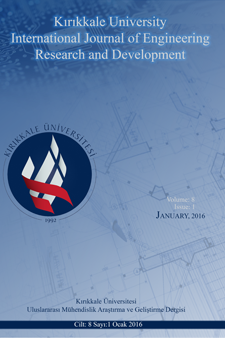Hassas kesme işlemine malzeme kalınlığı ve kalıp boşluğunun etkisinin sonlu elemanlar yöntemi ile analizi
Hassas kesme, kavislenme, kalıp boşluğu
Finite element simulation of effect of material thickness and die clearance on fine blanking process
Fine blanking, die roll, die clearance,
___
- Liu, Y., Hua, L., Mao, H., Feng, W. (2014). “Finite element simulation of effect of part shape on forming quality in fine-blanking process”, 11th International Conference on Technology of Plasticity, ICTP 2014, Procedia Engineering 81, 1108 – 1113.
- Hong, W., (2011). “Cam fine blanking technology and die design”, Advanced in Control Engineeringand Information Science, Procedia Engineering 15,137 – 141.
- Thipprakmas, S. (2010). “Application of Taguchi technique to investigation of geometry and position of V-ring indenter in fine-blanking process”, Materials and Design 31, 2496–2500.
- Mao, H., Zhou, F., Liu, Y., Hua, L. (2016). “Numerical and experimental investigation of the discontinuous dotindenter in the fine-blanking process”, Journal of Manufacturing Processes 24, 90–99.
- Sergejev, F., Peetsalu, P., Sivitski, A., Saarna, M., Adoberg, E. (2011). “Surface fatigue and wear of PVD coated punches during fine blanking operation”, Engineering Failure Analysis 18, 1689–1697.
- Küçüktürk, G., (2016). “AA5754 malzemenin kesme işlemlerinde kesme boşluğunun ürün kalitesine etkilerinin deneysel incelenmesi ve bulanık mantık ile tahmini”, Gazi Üniv. Müh. Mim. Fak. Der. Cilt 31, No 2.
- Kwak, T.S., Kim, Y.J., Bae, W.B. (2002). “Finite element analysis on the effect of die clearance on shear planes in fine blanking”, Journal of Materials Processing Technology 130–131, 462–468.
- Elyasi, M. (2013). “An Investigation on the Parametric Analysis of V-ring Indenter Mechanism in Fine-blanking Process”, International Journal of Mechanics and Applications, 3(4): 76-80.
- Başlangıç: 2009
- Yayıncı: -
Mixed Noise Removal with External Parameter in Image Denoising
KOBİ’lerde Eş Zamanlı Mühendislik: Otomotiv Tedarikçi Sektöründe Bir Uygulama
Munise Didem DEMİRBAŞ, Mustafa Kemal APALAK
Çatalan Baraj Havzasında Yağış Eksikliğinin Çeşitli Hidrolojik Sistemler Üzerine Etkileri
Vektör Otoregresyon (VAR) Modeli ile İklimsel Değişkenlerin İstatistiksel Analizi
AGREGA OLARAK ÇİNKO MADENİ CÜRUFU KULLANIMININ BETON BASINÇ DAYANIMINA ETKİSİ
Experimental evaluation of performance for micro wind turbines by using permanent magnets
Thermal Design Calculations for LED Luminaires
Mobilya İmalatı Esanasında Oluşan Gürültü Emisyonlarının ve Maruziyetinin Araştırılması
BÜYÜK VERİ GÖRSELLEŞTİRMESİNİN ÜLKELERİN TARIMSAL KATMA DEĞER GÖSTERİMİ İÇİN UYGULANMASI
